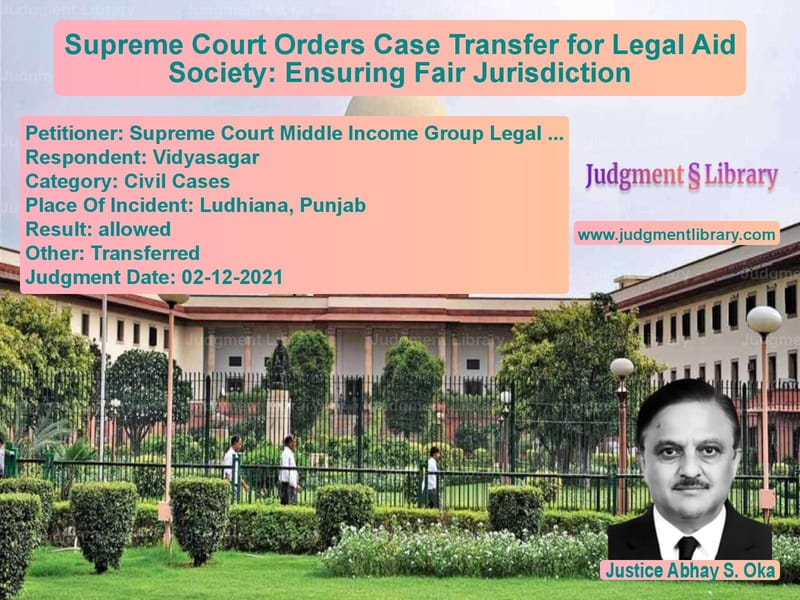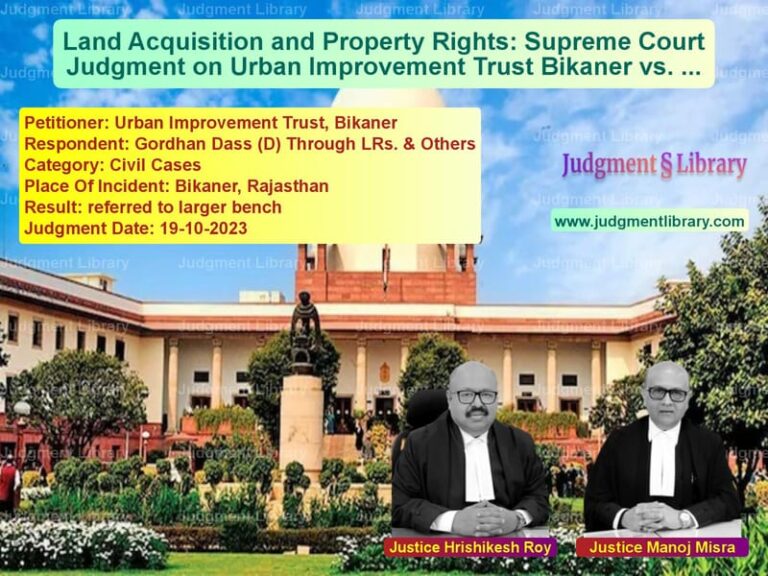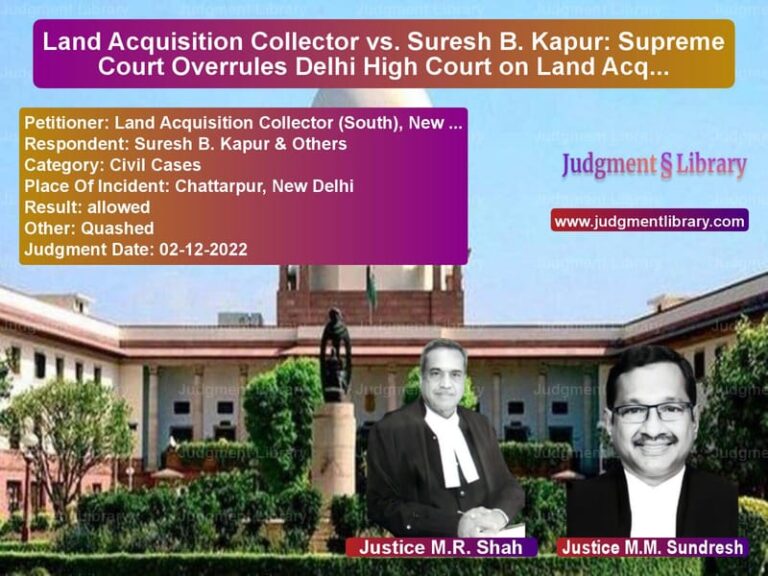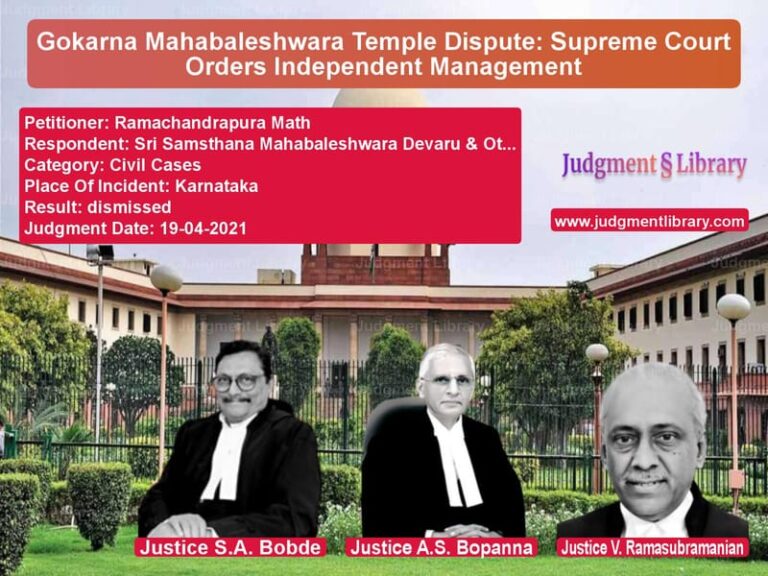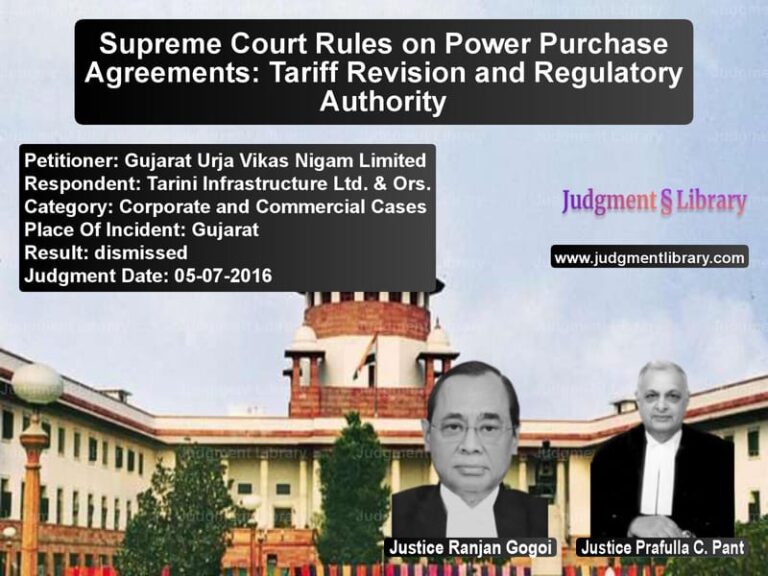Supreme Court Orders Case Transfer for Legal Aid Society: Ensuring Fair Jurisdiction
The Supreme Court of India, in the case of Supreme Court Middle Income Group Legal Aid Society vs. Vidyasagar, addressed the crucial issue of jurisdiction in civil disputes involving legal aid organizations. The judgment clarified the legal framework under Section 25 of the Code of Civil Procedure, 1908, emphasizing the importance of fair trial locations to prevent undue hardship to institutions providing legal assistance.
Background of the Case
The dispute arose from a financial disagreement between Vidyasagar, the respondent, and the Supreme Court Middle Income Group Legal Aid Society (the petitioner). The respondent had paid an amount of Rs. 8,500 to the Society in 2009 for legal assistance. However, he later demanded a refund of three times the deposited amount, citing alleged deficiencies in service.
When the Society refused to refund the inflated sum, the respondent filed a suit in the Civil Judge, Senior Division, Ludhiana, claiming:
- Refund of Rs. 8,500 multiplied by three
- Litigation cost of Rs. 5,000
- Compound interest on the claimed amount
The Legal Aid Society argued that defending the case in Ludhiana would cause significant inconvenience as the organization operated from New Delhi. It filed a transfer petition before the Supreme Court, seeking to shift the proceedings to the Patiala House Court, New Delhi.
Read also: https://judgmentlibrary.com/supreme-court-dismisses-review-petition-in-family-property-dispute-case/
Petitioner’s Arguments
The Legal Aid Society, represented by Senior Advocate Raju Ramachandran, presented the following arguments:
- The Society operates from New Delhi, and all its records, staff, and legal resources are based there.
- Defending the case in Ludhiana would create logistical difficulties, affecting the organization’s ability to provide legal aid to other individuals.
- The amount in dispute was small, and requiring the Society to defend the case in Ludhiana was disproportionate to the claim.
- The Society was willing to refund the original amount but not the additional claim made by the respondent.
- The respondent had failed to establish why Ludhiana was the appropriate jurisdiction, apart from asserting it in the plaint.
Respondent’s Arguments
The respondent, Vidyasagar, despite being given multiple opportunities, failed to appear and contest the petition before the Supreme Court. However, in his initial filings, he contended:
- The cause of action had arisen in Ludhiana, justifying his choice of jurisdiction.
- The Legal Aid Society should have provided better service, and he had the right to demand a refund.
- He had incurred financial losses due to alleged deficiencies in service.
Legal Issues Examined by the Supreme Court
The Supreme Court considered the following key legal questions:
- Jurisdictional Convenience: Whether a legal aid organization should be required to defend itself in a jurisdiction far from its operational headquarters.
- Fair Trial Principles: Whether requiring the petitioner to appear in Ludhiana would cause undue hardship.
- Non-Appearance of the Respondent: The implications of the respondent failing to contest the transfer petition.
Supreme Court’s Observations
Justice Abhay S. Oka, presiding over the case, made the following observations:
- The Society was established to provide legal aid to middle-income groups and should not be subjected to procedural disadvantages.
- The respondent did not justify why Ludhiana was the appropriate jurisdiction, apart from making a general assertion in his plaint.
- The transfer petition was unopposed, as the respondent failed to appear despite repeated notices.
- The case involved a small monetary claim, and requiring the petitioner to travel and defend the case in Ludhiana would be unfair.
Final Judgment
The Supreme Court ruled:
- The transfer petition was allowed.
- The case titled “Vidyasagar vs. Supreme Court Middle Income Group Legal Aid Society” was transferred from the Civil Judge, Senior Division, Ludhiana, to the Patiala House Court, New Delhi.
- The Court reiterated that convenience of the parties, particularly organizations working for public good, should be considered while determining jurisdiction.
Key Takeaways
- Jurisdictional Convenience: The ruling reinforces that cases should be heard in forums that minimize undue hardship on the parties.
- Importance of Appearance: Failure to contest a transfer petition can result in unfavorable orders.
- Legal Aid Protection: The judgment safeguards legal aid institutions from facing procedural disadvantages.
Impact of the Judgment
The Supreme Court’s ruling has broader implications for jurisdictional disputes involving organizations providing legal assistance:
- It sets a precedent that public service organizations should not be forced to defend cases in remote jurisdictions unless absolutely necessary.
- It strengthens procedural fairness by ensuring that cases are transferred when defending them in an inconvenient jurisdiction would cause prejudice.
- It highlights the importance of timely response in legal proceedings—failure to appear may lead to the case being decided ex-parte.
This judgment ensures that legal aid organizations are protected from jurisdictional disadvantages and are allowed to function efficiently while upholding consumer rights.
Petitioner Name: Supreme Court Middle Income Group Legal Aid Society.Respondent Name: Vidyasagar.Judgment By: Justice Abhay S. Oka.Place Of Incident: Ludhiana, Punjab.Judgment Date: 02-12-2021.
Don’t miss out on the full details! Download the complete judgment in PDF format below and gain valuable insights instantly!
Download Judgment: supreme-court-middle-vs-vidyasagar-supreme-court-of-india-judgment-dated-02-12-2021.pdf
Directly Download Judgment: Directly download this Judgment
See all petitions in Consumer Rights
See all petitions in Legal Malpractice
See all petitions in Judgment by Abhay S. Oka
See all petitions in allowed
See all petitions in Transferred
See all petitions in supreme court of India judgments December 2021
See all petitions in 2021 judgments
See all posts in Civil Cases Category
See all allowed petitions in Civil Cases Category
See all Dismissed petitions in Civil Cases Category
See all partially allowed petitions in Civil Cases Category

